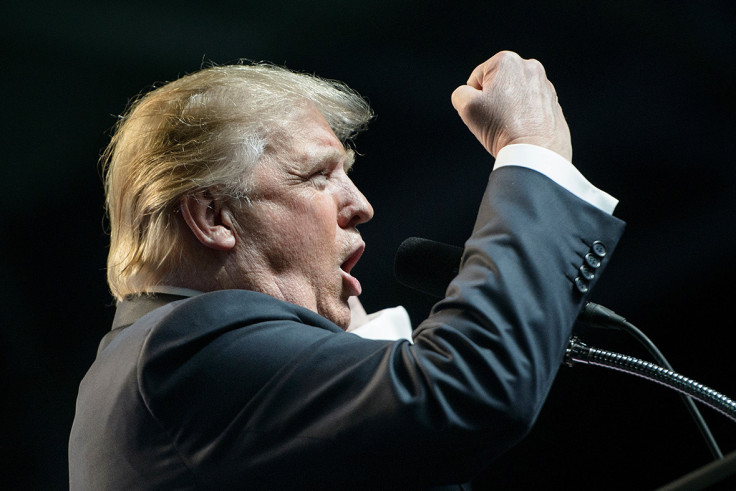Donald Trump: Can the Republican right derail billionaire's path to the White House?

Donald Trump will almost certainly be the Republican candidate for president, but that has not stopped voices within the American right from trying to derail the billionaire's path to the White House. Trump may have seen unprecedented success, despite insulting everyone from Muslims to the disabled over the last six months – as well as showing a frightening lack of knowledge about both foreign policy and the economy – but Republicans fearing a drubbing by Hillary Clinton in October have not yet given up on stopping him.
There are at least a couple of ways that Republicans could stop Trump, the most likely of which is to field a prominent party figure as an independent third candidate – most likely an inoffensive right winger, such as Mitt Romney, who has so far ruled out running but been outspoken in his criticism of the billionaire in recent weeks.
The Washington Post reported on May 6 that Romney had been approached by a conservative commentator who is spearheading the anti-Trump movement on the right. William Kristol has been working to find a candidate to run against Trump, launching the campaign in an editorial for his conservative newspaper, The Weekly Standard.
He hit back at criticism that it was too late to get a candidate on the ballot in October, pointing out that the only states with deadlines prior to June are Texas and North Carolina, both of which can be challenged in the US courts. Kristol said that even if these legal challenges failed, activists could launch a "write-in" campaign in the two states, where voters write the candidate's name on the ballot despite him or her not appearing on the ballot.
This quirk of US election law was used successfully in Alaska in 2010, when Tea Party candidate Joe Miller secured the Republican nomination, instead of the incumbent Lisa Murkowski. Over 100,000 of Murkowski's supporters turned out and wrote her name on the ballot, resulting in her winning the poll and becoming the only Senate candidate for over 50 years to win an election as a write-in candidate.
"Getting an independent candidate on the ballot in all 50 states is less difficult than conventional wisdom has it," Kristol wrote in an editorial published this week.
"The fact is that an articulate and independent-minded conservative, perhaps a generation younger than the two elderly plutocrats between whom the parties are asking us to choose, could make a real race of it [...]. How exciting would it be to inaugurate an attractive candidate who's neither Clinton nor Trump on January 20, 2017?"
It may be exciting, but it still remains unlikely. Many Republicans would rightly fear that voting for a third candidate – either officially or through a write-in – would split the conservative vote and hand a victory to Clinton, who many on the American right despise just as much as Trump. That said, this route to stopping Trump is not impossible, said David Mark, author of Doubletalk: The Language, Code And Jargon Of A Presidential Election.
If a Romney-type figure could split the vote to the extent that it prevented any candidate gaining the required 270 Electoral College votes, under US Constitutional law the role of choosing the next US president would be handed to the House of Representatives, which is dominated by the Republicans. This was the case in 1801 and 1825, although it remains highly unlikely and there has not been a comparable situation in the modern era.
In the end we'll probably see a two-person race between Donald Trump and Hillary Clinton
There had been a hope previously that Trump could be stopped at the Republican National Convention (RNC), during which an alternative candidate could be parachuted in and drum up enough support to beat the billionaire to the magical 1,237 delegates needed for the nomination. Not only are the rules governing how delegates vote at the RNC complex, but 2016 is unprecedented in the amount of hostility to the presumptive nominee within the party.
But it is unlikely for a number of reasons – not least that Cruz, the major contender to Trump, is no longer in the race. Equally, disputed conventions are rarely positive for parties ahead of elections, even if they make for excellent copy. As Mark pointed out, a concerted effort to derail Trump from within the party, given his massive popular support, would be seen as a snub of the entire nomination process.
"I think it's pretty unlikely Romney or another anti-Trump candidate could go on to claim the Republican nomination at this point. The party would basically be saying its whole nomination process is worthless − including slogging through the snows of Iowa and New Hampshire, the town hall meetings, endless loop of stump speeches, etcetera," he said.
"Why would anybody seek the Republican presidential nomination in the future if insiders could throw out the entire process? It's perfectly legal to do this, but quite unwise politically [...] This is probably all a reach. So in the end, we'll probably see a two-person race between Donald Trump and Hillary Clinton."
© Copyright IBTimes 2025. All rights reserved.





















